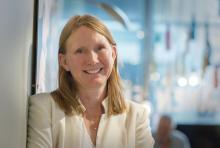Ministry collaboration spearheads government response
The Dutch government devoted a full chapter of its coalition agreement to sustainability, embedding it firmly in the long-term goals defined for the Netherlands. This priority offers much-appreciated support for ensuring that the Dutch government makes its SDG targets in 2030, according to Dorine Wytema, Katja Meijaard and Evelyn Jansen. These three women each represent a ministry in the SDG focal point group: Infrastructure and Water Management (I&W), Health, Welfare and Sport (VWS), and Economic Affairs and Climate (EZK) respectively. In this role, they regularly meet with the focal points from five other ministries to shape and implement the Dutch government response to the seventeen Sustainable Development Goals defined by the United Nations.
“We also want to help other countries. The Netherlands has extensive expertise in clean water and sanitation. We can share and market that knowledge.”
The Netherlands as forerunner
193 UN countries have committed to the Sustainable Development Goals, which aim to end poverty, protect the planet, and ensure prosperity for all. Compared to many other countries, the Netherlands is doing extremely well, says Wytema. “We are already performing well on healthcare and peace and justice. However, there are other aspects that we still need to work on. That includes air pollution and income inequality between men and women.” Meijaard adds that life expectancy for women in our country still has room for improvement. “We’re mid-level players in the EU in that respect. That’s probably because more Dutch women smoked in the 1980s and '90s than in other countries. It could be considered a side effect of women’s emancipation. As far as SDG 2, zero hunger, we’re currently dealing with the opposite. In this country, we’re fighting obesity and promoting a healthy diet.”Strategic, systematic collaboration
Jansen stresses the powerful capacity for strategic, systematic collaboration in the Netherlands, as well as the willingness to make concrete contributions to increasing economic sustainability. “In this country, we have a unique climate in which we can collaborate to achieve the Sustainable Development Goals and the 169 sub-goals that underpin them. And this collaboration is not just between ministries, either. The stakeholders are closely involved as well: knowledge institutions, companies, local governments, young people, and civil society are all engaged. The main challenge is to make sure we work on the goals together.” Wytema notes that involving young people is particularly important, since it’s their future at stake. “Every year, we submit a report to Parliament on our progress on implementing the Sustainable Development Goals. Last year’s report included a special annex where young people offered their own insights on their progress in that area."
Intertwined goals
When asked which goal is the top priority for each ministry, all three focal points gave the same, unanimous answer: it’s hard to choose just one, since the various SDGs and their sub-goals and indicators are often tightly interwoven and each has an impact on the others. Certain topics do receive more focused attention from specific ministries, of course. Thanks to the Prevention Agreement launched by Paul Blokhuis, State Secretary for Health, Welfare and Sport, Meijaard knows that the prevention and treatment of substance abuse will receive extra attention in the coming years. “In addition to smoking and obesity, Blokhuis has indicated that he also wants to include problematic alcohol consumption.” Wytema states that air, water, and soil pollution are priorities for Infrastructure and Water Management, aiming to reduce illness and premature death from pollution. “We also want to help other countries. The Netherlands has extensive expertise in clean water and sanitation. We can share and market that knowledge.”Integrated economic growth
Jansen states that ambitious plans have been announced at the Ministry of Economic Affairs and Climate. “We want to steer economic growth in the right direction. We’re collaborating with various stakeholders across the country on the new Climate Agreement, which includes a substantial reduction in CO2 emissions, making industry more sustainable, rolling out the Raw Materials Agreement, and launching transition agendas for the circular economy. We’re linking that to earning capacity. The technologies that we develop in these areas may also offer solutions to challenges elsewhere.”Cross-pollination
All three stress the importance of collaboration with stakeholders in the Netherlands. One of the government’s key partners in this process is RIVM, thanks to the institute’s wide-ranging scientific knowledge and in-depth research on various SDG-related topics. RIVM has launched a strategic programme dedicated to the Sustainable Development Goals. Wytema: “The EU sets higher targets than strictly required by the UN. RIVM already measures progress on a number of the SDGs, and attends international conferences on relevant topics. These comparative figures make it possible for us to gauge the progress our country has made on implementing the SDGs, so we can see where we are and what we still need to do.” Meijaard adds that RIVM can play a role as a knowledge centre, cross-pollinating various fields to ensure a comprehensive overview.
Read also the article Martijn Visser, UN youth representative for the Netherlands

